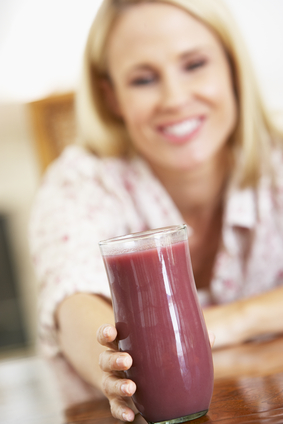by Dr. Craig A. Maxwell
Over the past couple of years, fruit smoothies have been quietly replacing soft drinks as the beverage of choice. But are smoothies bad for you or are they healthy?
That depends.
Recently, soft-drink giant Coke has been buying up smoothie companies to keep up with this latest nutritional trend. This has resulted in products that contain excessive amounts of sugar, pesticides, synthetic additives, and food dyes that have no place in a healthy diet.
Fruit Juice Smoothies Often Contain Too Much Sugar
The World Health Organization (WHO) recommends your sugar intake be no more than 5 percent of your daily caloric intake. This adds up to about 6 teaspoons (25 grams) of sugar each day. Just to give you an idea of what this looks like, one can of soda contains 10 teaspoons (40 grams) of sugar.
Now for an even more surprising number: A large smoothie from your local coffee shop can contain a whopping 23 teaspoons (115 grams) of sugar in a single serving!
Even though the sugar may be naturally occurring fructose, this excessive amount can have a significant impact on your health.
Side effects of excessive fructose consumption include:
- Abdominal Bloating
- Insulin Resistance
- Metabolic Syndrome
- Liver Dysfunction
- Neurological Dysfunction
If you make smoothies at home with fruit or fruit juice, your daily sugar intake could still be much higher than you intend.
Pesticides are a Concern Unless Produce is Organic
Another potential health danger of smoothies is pesticides. If the smoothie you’re purchasing or making at home is made with conventionally raised produce, you are getting a concentrated dose of pesticides in every glass.
Pesticides have been linked to neurological abnormalities, digestive disturbances, developmental delays, and an increased risk for the development of cancer. [1. http://onlinelibrary.wiley.com/doi/10.3322/caac.21170/full]
High-Fat Smoothies and Digestive Problems Don’t Mix
If you’re making smoothies at home as part of a Paleo or ketogenic diet, you may be mixing in good fats like coconut oil, avocado, and nut butters. While adding these fats can make your smoothie an ideal meal replacement, it can also wreak digestive havoc if you have a sensitive stomach.
Those with irritable bowel syndrome and similar inflammatory bowel disorders should refrain from consuming an excessive amount of fat in one sitting.
This is especially true when you’re drinking fat rather than eating it, as it will go through your digestive system much more quickly.
Side effects of too much fat in your smoothie may include bloating, gas, flatulence, inflammation, abdominal pain, and/or painful bowel movements.
The Best Smoothie Ingredients for Your Health

The best way to ensure you’re getting the most health benefits from your smoothies is to make them at home. This way, you have complete control over the ingredients. I recommend the bulk of your smoothies be organic and vegetable-based for maximum health benefits.
Add just one or two small pieces of fruit to offset the bitterness of certain vegetables (kale, spinach) to give it a more pleasing taste. A bit of plain organic yogurt or a splash of milk kefir can add a rich creamy taste while giving your gut a healthy probiotic boost.
A smoothie can be used as a healthy meal replacement or a between meal snack as long as the produce is organic, the smoothie is vegetable-based, and the sugar content is low. They are a healthy way to get a boost of nutrition without needing to count servings every day.
Speaking of Junk Food Disguised as Health Food, Have You Seen the New Fiber One Commercial?








